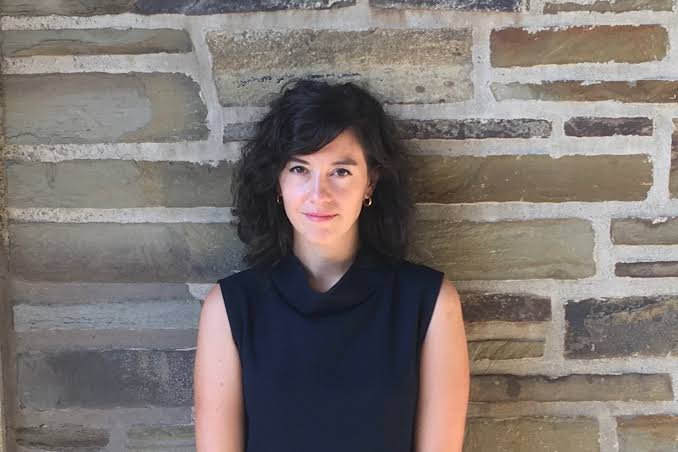
c/o The New York Review of Books
Professor of the Practice in Comparative Literature at Cornell University Sophie Pinkham—a frequent contributor to The New York Review of Books, among other publications—visited the University as a part of “The Critic and Her Publics,” a speaker series organized by the Shapiro Center for Creative Writing and Criticism, on Tuesday, Oct. 10, 2023. Director of the Shapiro Writing Center and Shapiro-Silverberg University Professor of Creative Writing and Criticism Merve Emre led the conversation with Pinkham, covering Pinkham’s journey into criticism, a live criticism of the poem “Black Earth” by Osip Mandelstam, and notions of care and cruelty in criticism.
Pinkham spoke at length about her connection to Russian and Ukrainian culture. She explained that she grew up surrounded by immigrants from the Soviet Union in New York City, and her interest in Russian and Ukrainian culture developed further while she was studying English at Yale University and exploring Russian poetry.
“I began to be fascinated by Russian poetry, in particular by the strange, charismatic, and weirdly sexy futurist poet, Vladimir Mayakovsky,” Pinkham said.
After college, Pinkham went on to work for the Red Cross in Russia, learned Russian in Kyiv on a Fulbright Grant, and received an MA in Russian, Eurasian, and Eastern European Studies and a PhD in Slavic Languages and Literatures from Columbia University.
“One thing that attracted me to Russian history was the prominence of poets and writers in Russian history,” Pinkham said. “A very large proportion of the streets in Russia are named after writers, right? And for Russian people, that’s completely pedestrian…. I was fascinated by that close linkage between literature and politics.”
Although Pinkham highlighted the value that she places on the relationship between literature and politics in her criticism, this was not how she first learned to approach literature: at Yale, analysis was completely divorced from the context of a work, an approach belonging to the formalist new criticism movement. Pinkham is no longer so absolute in separating analysis from context, but she shared that she continues to incorporate some of this approach.
“In my writing, I tried to maintain a respect for literature as something that can always be read with pleasure, with joy, with edification, without that historical context,” Pinkham said. “But I think that that context is a great pleasure as well, and further enriches your understanding.”
Pinkham emphasized that context does not only impact literature; literature also influences political and historical context.
“Today, there is a reflexive tendency to think of literature, in particular, but also other forms of culture, as sort of icing on the cake, as something that is expendable and unnecessary,” Pinkham said. “I think it is worth asking whether there is a current of power that is always literature and culture.”
Transitioning from this discussion of context, Emre asked Pinkham to read and comment on Mandelstam’s “Black Earth,” a Russian text that she provided two translations of. The English translations were strikingly different: For example, the first word of the poem, “Переуважена”, was translated as “manured” in one version and “blackened” in the second.
Pinkham explained that the Russian language can add a prefix to any word and essentially alter its meaning: In this case, “Переуважена” could be literally translated as over-respected, a difficult semantic quirk to express in English. Altogether, Pinkham felt that the first translation had convoluted and inaccurate phrasings and found the second translation more compelling.
“[In the original poem] there’s an overwhelming sensation even before you parse exactly what is going on with the words,” Pinkham said. “And so I think that the translation has probably failed, if it doesn’t hit you with a feeling before you try to figure out what the words actually mean.”
The talk concluded with a Q&A. Pinkham answered questions about her own criticism process and the effects of the Russia-Ukraine war on culture in the region.
Pinkham and Emre offered differing approaches to reviewing a work, especially when writing a negative review: Pinkham supported facing a work head-on, while Emre explained that some of her criticism attempts to “reconstruct” a work she dislikes as she would have written it.
“It really depends on the genre,” Pinkham said, “You can’t write your own poetry.”
Pinkham also cautioned against overindulging in negative reviewing.
“I think that cruelty [in reviewing] is actually one of the easiest things to do,” Pinkham said. “It’s not hard to be cruel…. I certainly feel that there are some things that deserve to be torn apart…but you have to start to think about why you’re doing that.”
Reflecting on how the war may affect Ukrainian and Russian culture, Pinkham was optimistic.
“[The war] feels like a fatal, absolute break with the past,” Pinkham said. “I think that the feeling that language and culture also and literature are essential parts of identity…there is a huge amount of literary energy in Ukraine now.”
Students expressed their enjoyment of Pinkham and Emre’s conversation, especially Pinkham’s narrative of her journey into the field of criticism.
“I’ve been involved with a lot of East European music and dance for many years, and I’ve had a lot of interactions with Americans where they’re like: ‘You’re not Eastern European—that’s cultural appropriation,’” Hannah Langer ’26 said. “And so I was interested in her perspective as an American outsider who came into Russia and Ukraine and was learning Russian.”
The next “The Critic and Her Publics” event is on Tuesday, Oct. 17, and will feature Carina del Valle Schorske, a writer and translator specializing in Caribbean literature.
Leo Bader can be reached at lbader@wesleyan.edu